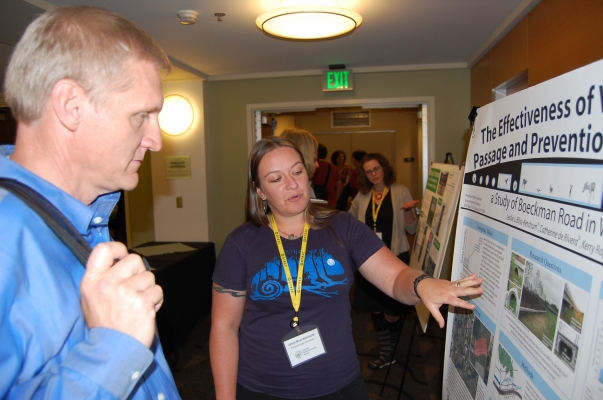Third Oregon Transportation Summit builds on successes

The third annual Oregon Transportation Summit drew 275 people to Portland State University for what has become a leading regional venue to connect transportation professionals with each other and with academic researchers. Workshops and plenary sessions spread some of the best ideas in transportation, while a poster session shared the latest research from OTREC faculty and students.
The OTREC awards honored leaders in their field. In an emotional presentation, Chris Achterman accepted the Peter DeFazio Transportation Hall of Fame award on behalf of his sister, Gail Achterman, who recently stepped down as chair of the Oregon Transportation Commission and is undergoing chemotherapy.
Achterman brought a different perspective to the commission, OTREC Director Jennifer Dill said in presenting the award. “Gail’s direction helped the Oregon Department of Transportation redefine itself, emphasizing active and multimodal transportation,” Dill said. “With her diverse background and open mind, she has welcomed the best ideas from multiple disciplines, recognizing their implication for transportation.”
In prepared remarks, Achterman returned the praise. “The Summit is only one of the Oregon Transportation Research and Education Consortium’s great contributions to Oregon’s transportation community. It brings people together from all over Oregon with leading national experts, nurturing the relationships we need to transform our transportation system.”
The remarks also served as a public announcement of Achterman’s decision to resign as chair of the commission. “It is my deepest hope, as I leave the Commission, that all of you will continue to work together to realize our shared vision of sustainable transportation systems serving livable communities throughout Oregon—rural, urban, suburban—to knit us together, allowing us to thrive in this amazing place we call home,” she said.
OTREC’s Researcher of the Year award honored Christopher Monsere, a Portland State University professor who has distinguished himself not only for his outstanding multimodal safety research but also for his creativity and commitment in the classroom. Monsere embodies the OTREC spirit of collaboration, having worked on OTREC projects with 15 faculty members from three partner campuses and three outside universities. His collaborations also reach beyond engineering, to planning, computer science, economics and environmental science.
Neil McFarlane, general manager of transit agency TriMet, accepted the OTREC Partner of the Year award for the agency. TriMet works often with OTREC because the collaboration makes sense, McFarlane said: TriMet’s willingness to share data makes meaningful research possible and the partnership means OTREC research findings will directly inform TriMet policy. “Openly sharing data that some agencies keep secret is more than just an extension of our philosophy,” McFarlane said. “It’s also good business.”
Staying on a transit theme, McFarlane also had the honor to introduce the summit’s keynote speaker, Mark Ovenden, bestselling author of “Transit Maps of the World” and other transportation works. Ovenden’s engaging presentation gave a broad sweep of the design questions transit agencies grapple with as they attempt to move people from point to point without losing or bewildering them.
U.S. Sen. Jeff Merkley opened the summit with a video greeting, which is excerpted below:
Plenary presentations from Johanna Zmud of RAND Corp. and Metro Council President Tom Hughes came next, followed by breakout workshops. The summit’s workshop sessions proved popular, with more than half of respondents in an OTREC survey rating them as the most valuable part of the summit. Popular session topics included the Highway Capacity Manual, active traffic management and parking pricing. “The topics were relevant and the speakers did a great job,” one respondent wrote.
This year’s summit also marked the first time OTREC faculty and student researchers presented their work in a poster session, with posters spread throughout the conference site. The popular poster session featured 19 posters from three OTREC campuses on topics such as cyclist route choice, driver behavior at unsignalized intersections and active transportation in suburbia.
Researchers fielded questions about their projects, giving conference attendees a fuller picture of OTREC research and its possible implications. One attendee wrote that the poster-session interactions were among the most valuable parts of the summit: “I also really enjoyed the poster session and the opportunity to hear about research projects in a one-on-one environment. Great job overall!”
A full photo set is on the OTREC Flickr site here. Speaker presentations are here.
